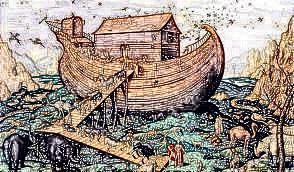* 本篇文章难度系数6.5,由《小仙英语伴读》人工智能难度分析系统提供评分。
* 提高英语阅读水平要 “轻翻译,重分析理解”,译文仅在不得已的时候参考用,这里的译文也不求高质量,甚至有时都不一定通顺,但一定有助于提高阅读能力。
* 如果愿意,仅阅读中文也是可以的,我们的文章都是言之有物的。

THE DELUGE OF OGYGES.【译】奥奇其斯大洪水。

【专有名词】deluge ['deljuːdʒ] n. 大洪水;暴雨;泛滥 v. 泛滥;大量涌入【专有名词】Ogyges 奥奇其斯,传说中古希腊的一位国王The first Egyptian who thus settled in Greece was a prince called Inachus.【译】第一个在希腊定居的埃及人是一位名叫伊纳库斯的王子。【单词】settled 原型:settle 动词过去式 ['setl] v. 解决;定居;安顿;平静;结算 n. 背长椅,座位;定居,安顿【单词】prince 名词 [prɪns] n. 王子;亲王;诸侯【单词】called 原型:call 动词过去分词 [kɔːl] vt. 呼叫;打电话;把 ...称为 n. 打电话;访问;召唤;呼叫;把 ... 看作 vi. 呼叫;(短暂的)拜访【专有名词】Egyptian [i'dʒɪpʃn] adj. 埃及的;埃及人的 n. 埃及人【专有名词】Greece 地名 [ɡriːs] n. 希腊【专有名词】Inachus (人名)伊纳库斯、伊那科斯Landing in that country, which has a most delightful climate, he taught the Pelasgians how to make fire and how to cook their meat.【译】他登陆了那个气候最宜人的国家后,教会了佩拉斯吉人如何生火和烹调肉类。【语法】sth., which ...,是定语从句,which后面的从句用来修饰前面的事物;【单词】delightful 形容词 [dɪ'laɪtfl] adj. 令人愉快的;可喜的【单词】climate 名词 ['klaɪmət] n. 气候;风气【单词】taught 原型:teach 动词过去式 [tiːtʃ] vt. 教;教导;教授;教训 vi. 给予指导【专有名词】Pelasgians 佩拉斯吉人、巴拉斯人,是古代希腊人对西元前12世纪前住在希腊的前希腊民族的称呼He also showed them how to build comfortable homes by piling up stones one on top of another, much in the same way as the farmer makes the stone walls around his fields.【译】他还向他们展示了如何建造舒适的家园,把石头一块一块地堆起来,就像农夫在田里砌石墙一样。【单词】comfortable 形容词 ['kʌmftəbl] adj. 舒适的;充裕的【单词】piling 原型:pile 动词现在进行式或动名词 [paɪl] n. 堆;大量;绒面;桩;<俚>大笔钱财 高大的旧建筑 v. 堆积;积累;拥入;夸张The Pelasgians were intelligent, although so uncivilized; and they soon learned to build these walls higher, in order to keep the wild beasts away from their homes.【译】巴拉斯人很聪明,虽然文明程度很不高;他们很快就学会了把这些墙建得更高,以便让野兽远离他们的家园。【用法】in order to 意为“为了……”,表示目的;在用法和意义上相当于so as to结构,但是in order to结构可以用于句首、句中,而so as to多用于句中。其否定式分别为:in order not to 和so as not to。in order to在句中表示目的时,常可以转化成in order that。如:We should work hard in order to pass the exam.=We should work hard in order that we can pass the exam.【单词】intelligent 形容词 [ɪn'telɪdʒənt] adj. 聪明的;智能的【单词】uncivilized 动词过去式 [ʌn'sɪvəlaɪzd] adj. 未开化的;不文明的 =uncivilised(英). 动词uncivilize的过去式和过去分词.Then, when they had learned the use of bronze and iron tools, they cut the stones into huge blocks of regular shape.【译】后来,当他们学会了使用铜和铁工具时,他们把石头切成规则形状的大块。【单词】bronze 形容词 [brɒnz] n. 青铜;青铜色;青铜制品;铜牌 adj. 青铜制的;青铜色的 vt. 使成青铜色【单词】iron 名词 ['aɪən] n. 熨斗;铁;刚强 v. 熨;烫 adj. 铁的;刚强的These stone blocks were piled one upon another so cleverly that some of the walls are still standing, although no mortar was used to hold the stones together.【译】这些石块被巧妙地一块一块地堆在一起,以至于有些墙(至今)仍然屹立着,尽管没有用灰浆把石块固定在一起。【短语】used to ... 过去一向,过去时常,过去曾(而现在不再)做某事; 例句:Young ladies used to have lessons in deportment. 少女们以前要上仪态课的。【单词】blocks 原型:block 动词一般现在时(第三人称单数) [blɒk] n. 街区;木块;石块;大楼;一组;阻塞(物);障碍(物) v. 阻塞【单词】piled 原型:pile 动词过去分词 [paɪl] n. 堆;大量;绒面;桩;<俚>大笔钱财 高大的旧建筑 v. 堆积;积累;拥入;夸张【单词】cleverly 副词 ['klevəli] adv. 聪明地【单词】standing 原型:stand 动词现在进行式或动名词 [stænd] v. 站立;忍受;位于;停滞 n. 站立;货摊;停顿;看台【单词】mortar 名词 ['mɔːtə] n. 臼;研钵;[军]迫击炮 n. 灰泥;灰浆 v. 用灰泥涂抹;用灰泥结合【单词】hold 动词原形 [həʊld] v. 拿着;控制;容纳;握住;持有;保持;掌握;认为;举行 n. 握住;控制;把握;立足点;延误;影响Such was the strength of the Pelasgians, that they raised huge blocks to great heights, and made walls which their descendants declared must have been built by giants.【译】巴拉斯人的力量是如此之大,他们把巨大的石块举到了很高的高度,并建造了他们的后代宣称一定是巨人建造的城墙。【单词】strength 名词 [streŋθ] n. 力气;强度;力量;长处【单词】raised 原型:raise 动词过去式 [reɪz] n. 上升;增高;高地 vt. 升起;举起;饲养;提出;引起;筹集,募集【单词】descendants 原型:descendant 名词复数形式 [dɪ'sendənt] n. 后裔;子孙;后代【单词】declared 原型:declare 动词过去式 [dɪ'kleə] v. 宣布(声明);申报;声明【单词】built 原型:build 动词过去分词 [bɪld] v. 建造;开发;创建;逐渐增强 n. 体格;身材【单词】giants 原型:giant 名词复数形式 ['dʒaɪənt] n. 巨人;巨物;大公司 adj. 巨大的As the Greeks called their giants Cyclops, which means "round-eyed," they soon called these walls Cyclopean; and, in pointing them out to their children, they told strange tales of the great giants who had built them, and always added that these huge builders had but one eye, which was in the middle of the forehead.【译】正如希腊人所说的巨人独眼巨人,意思是“圆眼”,他们很快就把这些墙称为独眼巨人;当他们向孩子们指出这些墙时,他们讲述了建造这些墙的巨人的奇怪故事,并且总是补充说,这些巨大的建筑者只有一只眼睛,那只眼睛在前额中间。【单词】round-eyed 形容词 adj. (因惊讶感叹等)睁大眼睛的【单词】strange 形容词 [streɪndʒ] adj. 奇怪的;陌生的;生疏或不自在的【单词】tales 原型:tale 名词复数形式 [teɪl] n. 故事;叙述;传说 v. 谈论,讲述,搬弄是非;【单词】builders 原型:builder 名词复数形式 ['bɪldə] n. 建设者;建筑工人;促进剂;增洁剂【单词】forehead 名词 ['fɔːhed] n. 前额;前部【专有名词】Greeks 希腊人【专有名词】Cyclops ['saɪklɒps] n. [希神]独眼巨人 Cyclopes【专有名词】Cyclopean [saɪkləʊ'piən] adj. 巨大的;独眼巨人的Some time after Inachus the Egyptian had thus taught the Pelasgians the art of building, and had founded a city called Argos, there came a terrible earthquake.【译】一段时间后,埃及人伊纳库斯就这样教导了佩拉斯人的建筑艺术,并建立了一个城市,称为阿尔戈斯,发生了可怕的地震。【单词】taught 原型:teach 动词过去分词 [tiːtʃ] vt. 教;教导;教授;教训 vi. 给予指导【单词】art 名词 [ɑːt] n. 艺术;美术;技巧;艺术品;人文学科;阴谋 adj. 艺术(品)的;美术(品)的【单词】building 原型:build 动名词 [bɪld] v. 建造;开发;创建;逐渐增强 n. 体格;身材【单词】terrible 形容词 ['terəbl] adj. 可怕的;极度的;糟糕的【单词】earthquake 名词 ['ɜːθkweɪk] n. 地震【专有名词】Argos 阿尔戈斯,城市名The ground under the people's feet heaved and cracked, the mountains shook, the waters flooded the dry land, and the people fled in terror to the hills.【译】百姓脚下的土地震动裂开,山岭震动,水漫过旱地,百姓惊恐地逃到山上。【单词】ground 名词 [ɡraʊnd] n. 地面;地方;根据;主题;立场;水平;背景 v. 使停飞;困在家中;放在地上;使 ... 搁浅;打基础;动词grind的过去式和过去分词形式【单词】heaved 原型:heave 动词过去式 [hiːv] v. 用力举起;抛出;扔;恶心;(费力地)发出(叹息等) n. 举;抛;起伏【单词】cracked 原型:crack 过去分词做形容词 [kræk] v. 破裂;砸开;发出爆裂声;撞击;破解;变嘶哑;崩溃;制裁;<非正式>开玩笑 n. 裂缝;裂痕;爆裂声;猛击;尝试;俏皮话 adj. 训练有素的【单词】shook 原型:shake 动词过去式 [ʃeɪk] v. 摇动;震动;握手 n. 片刻;摇晃;<美口>奶昔【单词】flooded 原型:flood 动词过去式 [flʌd] v. 淹没;充满 n. 洪水【单词】fled 原型:flee 动词过去式 [fliː] vi. 逃走;消失;逃避;(时间)飞逝 vt. 逃离【单词】terror 名词 ['terə] n. 恐怖;惊骇;<口>令人惧怕或讨厌的人或事物In spite of the speed with which they ran, the waters soon overtook them.【译】尽管他们跑得很快,但水很快就超过了他们。【短语】in spite of 表示“不顾;虽然,尽管”,后接名词、代词、从句。如:In spite of our repeated warnings, he still went his own way.【短语】take over 表示“接管;接收”。如:I intend you to take over. 我打算让你来接管。【单词】spite 动词一般现在时(除第三人称单数) [spaɪt] n. 恶意;怨恨 v. 刁难;惹怒;冒犯【单词】overtook 原型:overtake 动词过去式 [ˌəʊvə'teɪk] v. 赶上;突然来袭;压倒Many of the Pelasgians were thus drowned, while their terrified companions ran faster and faster up the mountain, nor stopped to rest until they were quite safe.【译】许多巴拉斯人就这样被淹死了,而他们惊恐的同伴们则越跑越快地上山,直到他们完全安全后才停下来休息。【单词】drowned 原型:drown 过去分词做形容词 [draʊn] vi. 淹死 vt. 淹死;淹没【单词】terrified 原型:terrify 动词过去式 ['terɪfaɪ] v. 使害怕;使恐怖;威胁【单词】companions 原型:companion 名词复数形式 [kəm'pæniən] n. 同伴;志趣相投的人;成对物品之一;参考书 v. 陪伴【单词】rest 动词原形 [rest] n. 剩余的部分;休息;支撑物;休止符 v. 休息;(使)倚靠;使(视线)停留在;搁在;依赖;基于;搁置;埋葬Looking down upon the plains where they had once lived, they saw them all covered with water.【译】俯瞰他们曾经居住过的平原,他们看到他们都被水覆盖着。【单词】plains 原型:plain 名词复数形式 [pleɪn] adj. 清楚的;简单的;坦白的;平常的;朴素的;纯的 n. 平原;广阔的区域 adv. 完全地;纯粹地【单词】covered 原型:cover 动词过去式 ['kʌvə] n. 封面;盖子;套子;表面 v. 覆盖;涉及;包含;掩护;给…保险They were now forced to build new homes; but when the waters little by little sank into the ground, or flowed back into the sea, they were very glad to find that some of their thickest walls had resisted the earthquake and flood, and were still standing firm.【译】他们现在被迫盖新房子,但当水一点一点地沉到地上,或流回海里时,他们非常高兴地发现,他们最厚的墙中有一些已经抵御了地震和洪水,而且仍然屹立不倒。【单词】forced 原型:force 过去分词做形容词 [fɔːs] n. 武力;暴力;力量;影响力;力量大的人或(事物);权力;(为某目的组织起来的)一群人;军队;部队;武装力量;警察部门;力;风力 v. 迫使;强迫;强制;使发生;强装(欢笑);人工催长【单词】sank 原型:sink 动词过去式 [sɪŋk] v. 下沉;沉没;渗透;低落;变低;衰弱;(太阳)落下 n. 水槽;沟渠;散热器;接收端 sinkable sank /【单词】flowed 原型:flow 动词过去式 [fləʊ] n. 流动;涨潮;流;流量 vi. 流动;涌出;飘动;流畅 vt. 淹没【单词】thickest 原型:thick 形容词最高级 [θɪk] adj. 厚的;浓密的;粗的;愚笨的【单词】resisted 原型:resist 动词过去分词 [rɪ'zɪst] v. 抵制;抵抗;反抗;忍住 n. 防蚀涂层【单词】flood 名词 [flʌd] v. 淹没;充满 n. 洪水【单词】firm 名词 [fɜːm] n. 公司;商行 adj. 坚定的;结实的;坚固的;严格的 v. (使)变得坚实;确定 adv. 稳固地;坚定地The memory of the earthquake and flood was very clear, however.【译】然而,地震和洪水的记忆非常清晰。【单词】memory 名词 ['meməri] n. 记忆力;回忆;记忆;[计]存储The poor Pelasgians could not forget their terror and the sudden death of so many friends, and they often talked about that horrible time.【译】可怜的巴拉斯人无法忘记他们的恐惧和这么多朋友的突然死亡,他们经常谈论那个可怕的时刻。【短语】make friends 表示“交朋友”,后常与with搭配,表示“与……交朋友”。如:We need to encourage our children to make friends with people who will pull them up instead of drag them down.【单词】horrible 形容词 ['hɒrəbl] adj. 可怕的;令人毛骨悚然的;令人讨厌的As this flood occurred in the days when Ogyges was king, it has generally been linked to his name, and called the Deluge (or flood) of Ogyges.【译】由于这场洪水发生在奥奇其斯为王的时候,因此通常这些事件都会被与国王的名字相关联,因此称之为奥奇其斯大洪水。【单词】occurred 原型:occur 动词过去式 [ə'kɜː] vi. 发生;存在;出现;想到【单词】king 动词现在进行式或动名词 [kɪŋ] n. 国王;(纸牌)老K adj. 王的;重要的;基本的 v. 成为国王 King. n. 金(姓氏)【单词】generally 副词 ['dʒenrəli] adv. 一般地;通常;普遍地【单词】linked 原型:link 动词过去分词 [lɪŋk] v. 联系;连接 n. 环;联系;节
,




